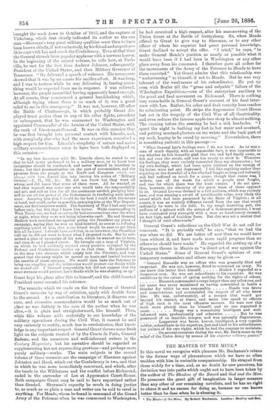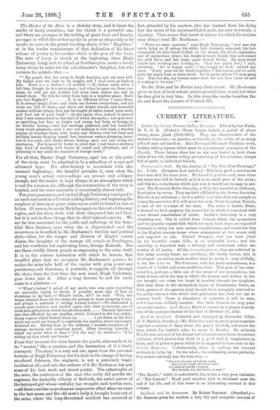THE MASTER OF THE MINE.* In this novel we recognise
with pleasure Mr. Buchanan's return to the former ways of pleasantness which we have so often trodden with him in amicable companionship. He strayed from them widely for a time, and, as no doubt he now perceives, his deviation was into paths which ought not to have been taken by the author of The Shadow of the Sword and God and the Man. He possesses the great gift of imagination in larger measure than any other of our remaining novelists, and he has no right to abuse it and no excuse for doing so, because no one knows better than he does when he is abusing it.
• The Master of the Mine. By Robert Buchanan. London; Bentley and Son:
The Master of the Mine is a sketchy story, and it bears the marks of hasty execution ; bat the sketch is a powerful one, and there are passages in the writing of great force and beauty, passages in which the author speaks in prose as eloquently as he speaks in verse in the grand boasting strain of his "Magellan," or in the tender reminiscence of that dedication of his latest volume of poetry to his mother which is the gem of the book. The note of fancy is struck at the beginning, when Hugh Trelawney, being sent to school at Southampton, meets a lovely being whom he takes for the schoolmaster's daughter, but who corrects his mistake thus :—
"'My people live far away in South America, and are very rich. My father sent me here to be taught, and I shall soon go back to him. Have yon a father ?'—I nodded.—' My father cried when I left him, though he is a great man ; and when he gave me these ear- rings, he told me my mother had worn them before me, and he kissed them. We live far away from here in a brighter place. Don't
you hate England ? It is so different where I come from. It is always bright there, and there are flowers everywhere, and the trees are full of fruit; and there are bright insects, and beautiful snakes without stings, that can be taught to twine round your neck, and feed out of your hand.'—As she spake thus, indeed, it seemed that I was transported to the land of which she spoke ; her eyes were so sparkling, her face so bright and sunny, her form so foreign in its slender beauty,—and her earrings glistened, and her beautiful ivory teeth gleamed,—and I saw her walking in that land, a wonder among all wonders there, with fruits and flowers over her head and brilliant insects floating round her, luminous snakes gleaming harm- less in her path, and dusky slaves waiting upon her and doing her courtesies. For it must be borne in mind that I had been a studious boy, fond of reading wild books of travel and adventure, and of picturing in my mind the wonders of foreign lands."
For all that, Master Hugh Trelawney, aged ten at this point of the story, must be admitted to be a schoolboy of a rare and advanced type. His after-history is consistent with this unusual beginning ; the fanciful pervades it, even when the young man's actual surroundings are prosaic and ordinary enough, and the reader is kept always in an atmosphere which is not the common air, although the construction of the story is hurried, and the mere narration is occasionally almost bald.
Ten years pass away, and we find Hugh Trelawney consigned to an uncle and aunt in a Cornish mining district, and beginning the roughest of lives in as queer company as could be found in fact or fiction. Of course, he meets Madeline again in this out-of-the-way region, and the story deals with their chequered fate and love ; but it is not in these things that its chief interest consists. We are far less concerned for the perils and sufferings of the beau- tiful Miss Graham, even when she is shipwrecked—and the occurrence is described in Mr. Buchanan's forcible and poetical style—than for the danger and distress of Hugh's cousin Annie, the daughter of the strange old couple at Pendragon, and her worthless but captivating lover, George Redruth. Nor are these vividly drawn people so engrossing as the mine itself.
It is in the curious fascination with which he invests that dreadful place that we recognise Mr. Buchanan's power ; he makes the mine take hold of the reader with grim power and
persistency,—it threatens, it portends, it suggests all through the story, from the first time the new hand, Hugh Trelawney, goes down into it. After a long descent he and his uncle
come to a platform :—
"What's below,' I asked of my uncle, who was again regarding me curiously, trying to detect if possible some sign of fear or shrinking in my face.—' What's below, lad ?' he said. 'Wha, the water drained from all the mine, the pumps at wark pumping it awt, and p'raps a cartload o' ratting human bavens.'—We descended a couple more ladders and landed again, this time to traverse one of
those side galleries in which the pit abounded The only light now was that afforded by our candles, which flickered in the hot, sickly, damp vapour which floated about us I sat down on the floor while my uncle set himself to replenish the candles, which had nearly flickered out. Sitting thus in the stillness, I became conscious of a strange moaning and coughing sound. After listening intently, I asked my uncle what it was.—' It's the sae,' he returned ; it be rolling up thar above our heads.'"
From that moment the mine haunts the youth, afterwards to be its "master," like a passion, and the fascination of it is finely conveyed. The story is a very sad one, apart from the personal fortunes of Hugh Trelawney (for his trial on the charge of having murdered Johnson, the engineer, is not a genuinely tragic
incident at all), and into the sadness of it Mr. Buchanan has put some of his best work and truest poetry. The catastrophe at the mine, the confession of the man who really did murder the engineer, the dastardly villainy of Redruth, the awful sorrow of the betrayed girl whose credulity has wrought such terrible ruin, —all these combine toproduoe an impressive effect when we come to the last scene, and the old man's body is brought home out of the mine, where the long-threatened accident has occurred at
last, attended by his nephew, who has learned from his dying lips the secret of his unpremeditated guilt, for ever to remain a mystery. Then comes that touch of nature for which his readers may always trust Mr. Buchanan :—
" When we went upstairs," says Hugh Trelawney, "and saw my uncle lying as if asleep, his white hair decently arranged, his face composed, his thin hands folded on his breast, his whole expression one of mysterious peace, his daughter knelt beside him and kissed his cold brow, and her tears again flowed freely. My aunt stood beside her, weeping and looking on. God has taken him,' I said, solemnly. He is happy now.'—' Ay, happy wi' God,' sobbed my aunt. Forty year we ha' dwelt together i' this house, and he ne'er gave me angry look or cross word. He be gawn, where I'll soon gang too. Wait for me, my bonnie man—wait for her that loves 'ee and is coming to 'cc soon!
So the Mine and its Master keep their secret. Mr. Buchanan gives us less of local colour (above-ground) than usual, but what he does give is very true. In this story the reader breathes the air and hears the accents of Cornish life.



































 Previous page
Previous page